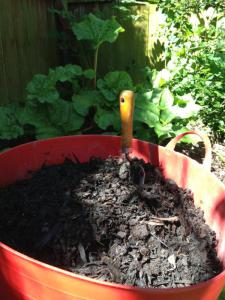We had an interesting question come in last week!
Was Black Soldier Fly (BSF) composting the most efficient composting system ever?
After many years in composting, we had not come across BSF before, intrigue and a hint of competiveness that any system might be better than the HOTBIN, we did a bit of googling. You learn something new every day!
- BSF (Hermetia_illucens) is a species of fly with native to America (with a cousin down in Australia). There will be a UK entomologist who will no doubt identify a cousin in UK, but so far not aware – and hence possible reason we have not come across them in UK)
- It has a niche habitat – rotting food/manure. The fly lays eggs in compost and the larvae (some would say maggots) eat the food waste – and they appear pretty good at it. (This is no different to house flies and or vinegar/fruit flies – BSL are much bigger and eat more!)
- The larvae are not meant to be allowed to hatch into flies (ie pupate), they are collected and used as chicken feed and/or fishing bait
- There are a number of specialist bins designed to house, retain and harvest the larvae. As a food waste disposal system, it more closely resembles worm composting.
What about claims to be the “most efficient”? We are always suspicious of ‘fastest and best’ and try and uncover the scientific facts. There was no reference to a specific quote and we did not see the claim on sites listed below. It looks like there is enthusiasm for BSF, as highly efficient and this enthusiasm comes from the visible disappearance of food waste as BSF larvae eat food within 2-4 days. If you compare 4 days to “composting” even hot composting at 30 days – you might think it’s more efficient. But decomposition (eating waste food) is just a set of biochemical reactions involving enzymes – the rules are fixed: the rate at which reactions take place is governed by the Arrenhenius equation – which basically boils down to temperature. BSF Larvae die at 40C, thermophilic bacteria operate at 60C and in many cases 70C.
In simple terms, larvae at 40C work at the same speed as bacteria at 40. If we say composting at 10C is rate X1, then larvae and bacteria at 40C are X8 times faster, but bacteria at 60C are 32 times faster – speed wise, we think no contest!
But is speed what we need to focus on? What are we trying to accomplish? Are we seeking to dispose of food waste fast, make fish bait or make great humus with high nutrient and water holding capacity that dramatically improves soil fertility? (With the added plus of diverting food from landfill).
Nature eventually recycles all plant and animal matter back to carbon dioxide and water. Does it matter if the larvae eat food, then the chickens eat the larvae and then the bacteria eat the chicken poo? Or that the bacteria eat the food (and release carbon dioxide), but leave some residual waste (compost) that gets eaten much later and then finally becomes carbon dioxide. Both routes are carbon neutral and better that sending it to landfill where it will decompose anerobically releasing methane. BSFL larvae eat the food and produce a small amount of residual compost like material. Composting and hot composting produces a lot of compost for the garden. Compost is beneficial to the soil before it is finally returned to carbon dioxide.

Hmm, im a little confused…
It appears that the HOTBIN can reach hotter temperatures at 60C which we believe means it can work faster.
Sorry if we confused you, of course the HOTBIN has been designed to compost both food & garden waste in your own back yard, this includes ALL food waste. We know the HOTBIN recycles food waste effectively and it looks like from our desk research that The Black Fly Soldier does an extremely effective job too. I think it really boils down to personal preference and what waste you have to recycle.
Great article with informative content.Thanks for sharing your views.
great article. thanks for the review on black soldier fly composting. if you can handle larvae in your bins and would like to know more visit our website.